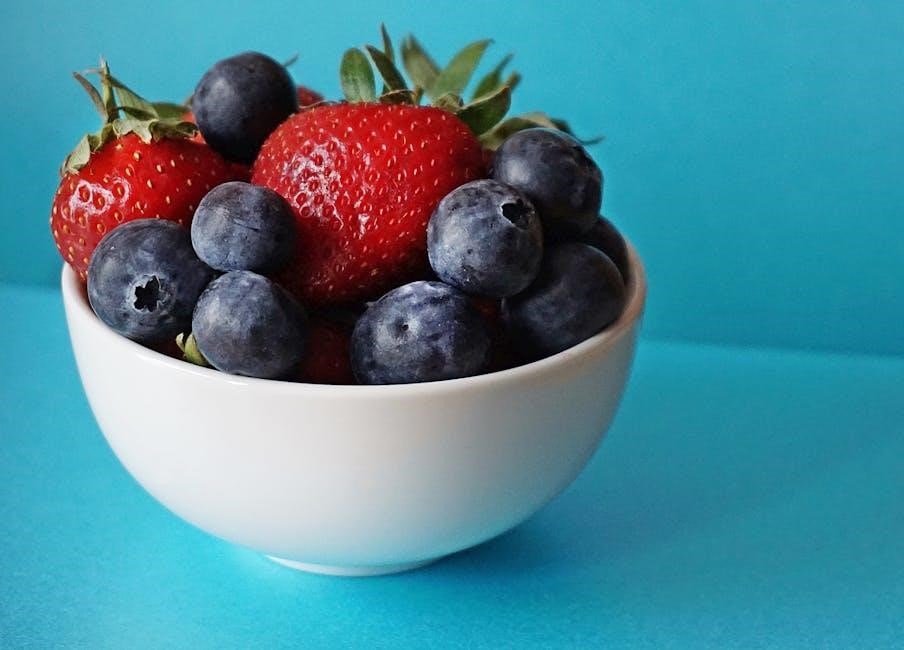A concussion, a type of traumatic brain injury, affects cognitive function and recovery․ Diet plays a crucial role in supporting brain health and expediting recovery through tailored nutrition․
1․1 Understanding Concussion and Its Impact on the Brain
A concussion, a mild traumatic brain injury, occurs from a blow to the head, face, neck, or body, causing brain movement․ It disrupts brain cell communication, leading to symptoms like headaches, dizziness, and cognitive fog․ The brain, highly dependent on energy and nutrients, becomes vulnerable post-injury․
1․2 The Importance of Nutrition in Concussion Recovery
Nutrition is vital for concussion recovery, as the brain requires essential nutrients to restore energy and reduce oxidative stress․ A tailored diet supports brain function, aids in healing, and replenishes depleted micronutrients like vitamins C, D, E, magnesium, and zinc․ Proper hydration and balanced meals are critical to fuel recovery and minimize lingering symptoms, ensuring optimal brain health․

Essential Nutrients for Concussion Recovery
Vitamins C, D, and E, along with magnesium, zinc, and omega-3 fatty acids, are crucial for reducing oxidative stress and supporting brain health during recovery․
2․1 Vitamins C, D, and E: Their Role in Reducing Oxidative Stress
Vitamins C, D, and E are antioxidants that combat oxidative stress, a common post-concussion issue․ Vitamin C protects neurons, while vitamins D and E support brain function and reduce inflammation, aiding recovery․
2․2 Magnesium and Zinc: Key Minerals for Brain Health
Magnesium and zinc are essential for brain health after a concussion․ Magnesium supports nerve function and energy production, while zinc aids in neurotransmitter function and tissue repair․ Both minerals can become depleted post-injury, making their replenishment crucial for recovery and reducing neurological deficits․
2․3 Omega-3 Fatty Acids: Anti-Inflammatory Properties
Omega-3 fatty acids, particularly EPA and DHA, are potent anti-inflammatory agents that support brain recovery post-concussion․ They reduce inflammation, promote neuronal repair, and enhance cognitive function․ Found in fatty fish like salmon and sardines, these acids are vital for mitigating oxidative stress and aiding in the healing process of the injured brain․
Anti-Inflammatory Foods for Concussion Recovery
Anti-inflammatory foods are essential for concussion recovery, reducing brain inflammation and promoting healing․ Berries, dark leafy greens, and fatty fish are rich in antioxidants and omega-3s, supporting brain health and recovery․ These foods help minimize oxidative stress and inflammation, aiding in the restoration of cognitive function and overall well-being during the recovery process․
3․1 Berries: Blueberries, Cranberries, and Strawberries
Berries are rich in antioxidants, reducing oxidative stress and inflammation after a concussion․ Blueberries, cranberries, and strawberries contain flavonoids that support brain health and cognitive recovery․ Incorporating them into meals or snacks can enhance recovery by promoting neural repair and improving communication between brain cells․ Their anti-inflammatory properties make them a valuable addition to a concussion recovery diet․
3․2 Dark, Leafy Greens: Spinach, Kale, and Swiss Chard
Dark, leafy greens like spinach, kale, and Swiss chard are packed with essential vitamins and minerals such as folate, magnesium, and zinc․ These nutrients support brain health, reduce inflammation, and aid in recovery after a concussion․ Incorporating them into meals helps combat oxidative stress and promotes neural repair, making them a crucial part of a recovery-focused diet․
3․3 Fatty Fish: Salmon, Mackerel, and Sardines
Fatty fish like salmon, mackerel, and sardines are rich in omega-3 fatty acids, which reduce inflammation and support brain health․ These anti-inflammatory properties can alleviate concussion symptoms such as headaches and cognitive issues․ Incorporating fatty fish into your diet, as recommended by guidelines, promotes neural repair and enhances recovery, making them a key component of a concussion recovery diet․
Hydration and Its Role in Concussion Recovery
Adequate hydration is essential for brain function and recovery after a concussion․ Water supports cognitive healing and prevents dehydration, which can worsen symptoms like headaches and fatigue․
4․1 The Importance of Adequate Hydration
Adequate hydration is critical for brain function and recovery after a concussion․ The brain, composed of approximately 80% water, relies on proper hydration to maintain cognitive function․ Dehydration can exacerbate symptoms like fatigue, headaches, and dizziness․ Ensuring sufficient water intake supports the brain’s healing process and prevents complications, making hydration a cornerstone of post-concussion care․
4․2 Recommended Daily Water Intake
Aim for 8-10 glasses of water daily, following the “8×8” rule (8 ounces, 8 times a day)․ Adjust intake based on activity levels and recovery needs․ Proper hydration supports brain function and recovery․ Monitor for signs of dehydration, such as dizziness or fatigue, and increase water intake if symptoms arise․ Staying hydrated is essential for optimal healing post-concussion․

Foods to Avoid During Concussion Recovery
Processed foods, sugary snacks, and inflammatory foods can hinder recovery by reducing nutrient absorption and worsening symptoms․ Avoid these to support brain health and healing effectively․
5․1 Inflammatory Foods: Processed Foods and Sugary Snacks
Processed foods and sugary snacks trigger inflammation, worsening concussion symptoms․ These foods can deplete essential nutrients and cause energy crashes, hindering brain recovery․ Avoiding them helps reduce inflammation and supports healing․
5․2 Foods That Can Exacerbate Symptoms
Certain foods, like refined carbohydrates and artificial additives, can worsen concussion symptoms by causing blood sugar spikes and inflammation․ These foods may exacerbate fatigue, headaches, and cognitive fog, delaying recovery․
Meal Planning Strategies for Concussion Recovery
Planning meals rich in nutrients supports brain healing and energy needs, ensuring a balanced intake of proteins, carbs, and fats to stabilize blood sugar and aid recovery․
6․1 Balanced Meals: Combining Proteins, Carbohydrates, and Healthy Fats
Balanced meals combining lean proteins, complex carbs, and healthy fats provide sustained energy and support brain repair․ Protein aids tissue repair, while carbs fuel brain function․ Healthy fats, like omega-3s, reduce inflammation and promote neural health․ This combination stabilizes blood sugar and ensures optimal nutrient absorption, critical for recovery․
6․2 Intermittent Fasting: Potential Benefits for Healing
Intermittent fasting involves periods of eating and fasting, potentially aiding concussion recovery by reducing inflammation and enhancing cellular repair․ A common practice is fasting from 6 PM to 8 AM, allowing the body to focus on healing․ This approach may increase energy levels and reduce fatigue, supporting overall recovery when combined with a balanced diet․

Caloric Needs and Brain Function
The brain requires significant caloric intake, using 20% of daily calories, and needs over 40 nutrients for optimal function, especially after a concussion․
7․1 The Brain’s High Energy Requirements
The brain consumes 20% of daily calories, despite its small size, requiring over 40 nutrients for optimal function․ After a concussion, energy demands remain high to support recovery․ Key nutrients like glucose, omega-3s, and antioxidants are essential for cellular repair․ A nutrient-rich diet ensures the brain receives the fuel needed to reduce oxidative stress and promote healing․ Proper hydration also supports brain function, as even mild dehydration can exacerbate symptoms․
7․2 Ensuring Adequate Caloric Intake
After a concussion, maintaining adequate caloric intake is vital to support brain function and recovery․ The brain requires a consistent energy supply, and insufficient calories can hinder healing․ A balanced diet rich in proteins, healthy fats, and complex carbohydrates provides sustained energy․ Prioritizing nutrient-dense foods ensures the brain receives the necessary fuel to recover effectively without overloading the digestive system during sensitive periods․

Early Nutrition After Concussion
Early nutrition after a concussion is crucial for brain recovery․ Focus on nutrient-rich foods to reduce inflammation and support healing, while managing gastrointestinal discomfort if present․
8․1 The First 24 Hours: Critical Nutrition Timing
The first 24 hours post-concussion are vital for initiating recovery․ Prioritize anti-inflammatory foods like berries, leafy greens, and omega-3 rich fish to reduce oxidative stress and inflammation․ Incorporate easily digestible meals to minimize gastrointestinal discomfort, ensuring adequate hydration and essential nutrients are delivered promptly to support brain function and healing during this critical period․
8․2 Managing Gastrointestinal Distress
Nausea and vomiting are common post-concussion symptoms․ Opt for bland, easily digestible foods like bananas, toast, and applesauce to minimize discomfort․ Avoid heavy, fatty, or spicy meals that exacerbate symptoms․ Small, frequent meals can help manage gastrointestinal distress while maintaining essential nutrient intake for recovery․
Long-Term Dietary Considerations
Sustaining a nutrient-rich diet is vital for long-term brain health after a concussion․ Focus on whole foods, omega-3s, and antioxidants to support ongoing recovery and reduce inflammation over time․
9․1 Sustaining Nutrient-Rich Diets
Sustaining a nutrient-rich diet is essential for long-term brain health after a concussion․ Focus on whole foods, omega-3s, and antioxidants to support ongoing recovery and reduce inflammation over time․
9․2 Monitoring and Adjusting Dietary Plans
Regularly monitoring and adjusting dietary plans ensures personalized nutrition needs are met․ Track symptoms, energy levels, and cognitive function to tailor meals, incorporating feedback from healthcare providers for optimal recovery and brain health․

The Role of Supplements in Concussion Recovery
Supplements like omega-3s, vitamins C, D, E, magnesium, and zinc support brain health and reduce inflammation․ Consult a healthcare professional to determine the best options for recovery․
10․1 Recommended Supplements
Omega-3 fatty acids, particularly EPA and DHA from fatty fish, reduce inflammation and support brain healing․ Vitamins C, D, and E act as antioxidants, combating oxidative stress․ Magnesium and zinc are essential for neuronal function and recovery․ These supplements, tailored to individual needs, can enhance recovery when combined with a balanced diet and professional medical guidance․
10․2 Consulting a Healthcare Professional
Consulting a healthcare professional is essential for personalized dietary advice post-concussion․ They can recommend supplements tailored to individual needs, ensuring safe and effective recovery․ A professional evaluates symptoms, medical history, and current treatments to create a comprehensive plan, minimizing risks and maximizing benefits from nutrition and supplementation․

Combining Diet with Other Recovery Strategies
Combining a tailored diet with exercise, rest, and sleep hygiene enhances concussion recovery․ These strategies support brain health, reduce symptoms, and promote overall well-being, aiding in a faster return to normal activities․
11․1 Exercise and Rest
Balancing exercise and rest is vital for concussion recovery․ Gentle, early cardio exercise can reduce symptoms and improve brain function, while excessive activity may worsen symptoms․ Rest allows the brain to heal, preventing prolonged recovery․ A gradual return to physical activity, guided by healthcare professionals, supports overall well-being and minimizes the risk of complications․
11․2 Sleep Hygiene
Establishing proper sleep hygiene is essential for concussion recovery․ Consistent sleep schedules, a relaxing bedtime routine, and a dark, quiet environment promote better rest․ Avoiding screens before bed and limiting stimulants can enhance sleep quality, which is crucial for brain healing․ Adequate sleep supports cognitive recovery and reduces fatigue, aiding in the overall recuperation process effectively․
Creating a Concussion Diet Plan
Develop a personalized diet plan focusing on nutrient-rich foods, hydration, and anti-inflammatory options․ Balance proteins, carbs, and healthy fats, and monitor progress to ensure optimal recovery support․
12․1 Personalizing Your Diet Plan
Personalizing your diet plan involves tailoring meals to your specific needs and symptoms․ Incorporate anti-inflammatory foods, stay hydrated, and consider supplements like omega-3s․ Track progress and adjust based on recovery milestones to ensure optimal nutrition and symptom management․ Consult a healthcare professional to customize further and address individual deficiencies or sensitivities for a comprehensive approach․
12․2 Implementing and Tracking Progress
Implementing a concussion diet requires consistency and monitoring․ Use a food diary to track meals, hydration, and symptoms․ Regularly assess cognitive and physical improvements․ Adjust portions or food choices based on energy levels and recovery pace․ Schedule follow-ups with a healthcare provider to evaluate progress and ensure the diet aligns with healing goals, making adjustments as needed for optimal results․